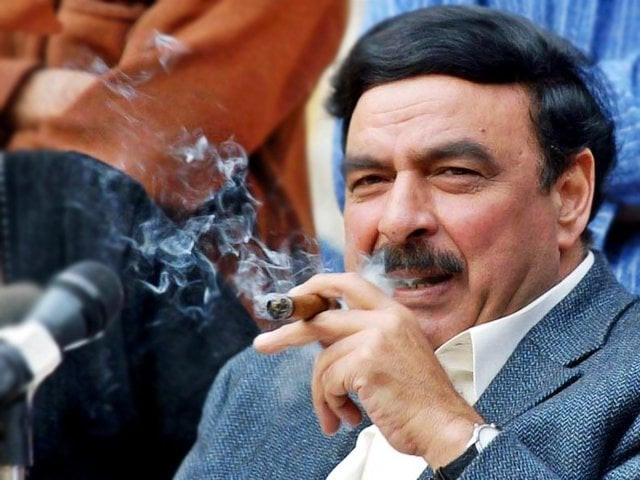CPEC: what’s stopping Pakistan Railways?
The track will ultimately extend to Kashghar, providing access to the BRI railway grid.

Railways Minister Sheikh Rashid. PHOTO: AGENCIES/FILE
In Pakistan however, we have yet to initiate the up-gradation and doubling of ML-1 from Karachi to Peshawar. The track will ultimately extend to Kashghar, providing access to the BRI railway grid.
For now, the ML-1 up-gradation project remains limited to neatly-ribboned blue files, prominently displaying the Government of Pakistan’s emblem, slowly moving from one ministry to another. Ministers and their ministries are bickering over approval processes; feasibility studies are taking forever to complete; while the intimidating $8 billion price tag keeps on haunting those who dare to touch these files.
Irrespective of these political scuffles, turf wars and blame games that characterise the usual business of government, there are three fundamental reasons behind this inaction.
First is the prevailing economic crisis and the ongoing IMF programme. Not only has the IMF raised serious concerns about Pakistan’s debt sustainability, but it has also placed a tight limit on the number of government guarantees. In the absence of any government guarantees the ML-1 financing may have to be undertaken by the Pakistan Railways itself, which would need other guarantee mechanisms.
Moreover, the fiscal constraints leave little room for any significant co-contribution. The total cost of the project is $8.2 billion, with 85% financing coming from China with a grace period of 8 to 10 years. Although this would mean no immediate outflows on account of repayment, the remaining 15% which translates into a whopping Rs193 billion would have to be contributed by Pakistan. Even for the first phase of $2.3 billion, we would need to pitch in Rs54 billion. If the government is serious about ML-1 up-gradation, now is the time to figure out these issues and find workable solutions.
Secondly, the newly formed debt commission is looking into past mega projects, while NAB and provincial anti-corruption authorities are actively sniffing for corruption everywhere. A suspect is treated as a convict and before he could prove his innocence (or be proven guilty) he would have served years in prison already. In this situation, it is not easy to find a bureaucrat who is willing to sign on this multibillion-dollar framework agreement.
Thirdly comes the pricing of the project. The project is likely to follow the CPEC procurement modality, with limited competition amongst Chinese contractors. This should be fine as long as the pricing remains competitive. But international benchmarks suggest that this price is probably on the higher side. The 1,214-kilometre long Chinese Geku Railway due to be completed in 2019, for instance, costs $5.4 billion to build from scratch. Considering that ML-1 is an upgrade the price tag of $8.2 billion for 1,872 kilometres looks a little steep.
But such comparison could also be misleading, as project specificities could sometimes cause large cost variations. An alternative approach could be to limit the CPEC framework agreement to two of the three project components and undertake one component through international competitive bidding. This could help the government in real price discovery and can support in price negotiations with the Chinese.
If handled right, the ML-1 could become Prime Minister Imran Khan’s legacy that could get him political dividends for years, like the Motorway did for Mian Nawaz Sharif, or else it could easily turn into political baggage.
Published in The Express Tribune, September 3rd, 2019.
Like Opinion & Editorial on Facebook, follow @ETOpEd on Twitter to receive all updates on all our daily pieces.













COMMENTS
Comments are moderated and generally will be posted if they are on-topic and not abusive.
For more information, please see our Comments FAQ